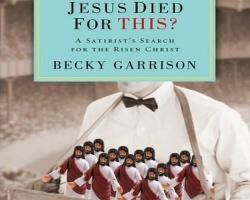One can get a spiritual buzz at any gathering of the faithful, but I am wondering how we can all be as shrewd as snakes and innocent as doves in deciding where we invest our time and energies (
Are those gathered doing more than just contextualizing their faith, blogging beyond belief and engaging in other postmodern ponderings? Often, I could get the same speeches via a live Web conference, especially if participants can join in the conversation in real time through online tools such as Twitter and text messaging. (Along those lines, perhaps we should all recalculate our expense accounts and carbon footprints in light of the ongoing economic and environmental crises.)
This Westernized conference model consisting of speakers and passive participants seems to appeal mostly to postgraduate players. You can adjust things a bit with a more youthful and relevant lineup of speakers. Then throw in a few workshops and maybe some hands-on activities for some spiritual spice. But the end result isn’t likely to appeal to those who encounter the holy through less talky methods, especially if they happen to be from non-Western European backgrounds.
Also, very few Christians regularly fly first or even economy class. Heck, I can’t afford the money or the time to attend the vast majority of invites that cross my desk. So I try to focus my energy and limited finances on festivals that bring together a wide swatch of people from different cultures for one giant communal party.
Let’s be honest. If we’re truly interested in “being the church,” then maybe we need to stop conference-hopping quite so much and look around our neighborhoods. What keeps us from participating in local festivals, block parties, church suppers, potlucks in people’s homes, and whatever else they’re doing?
After all, this is how the upside-down kingdom of God works. Just as the king opened up his banquet to those deemed unworthy to sit anywhere near his majesty, Jesus commands us to go beyond our Christian comfort zones and welcome those viewed as undesirable by our secular society (
Something tells me efforts to change this un-missional model will involve stepping in some really deep shift. After all, according to the Gospel of Mark, James and John, the sons of Zebedee, requested to sit at Jesus’ left and right hand (
Here I confess to being guilty more times than I care to admit of buying into someone’s blog buzz. (Amazing how anyone can slap some leafy logo on their site and call themselves a “pastor” when their church consists only of their cat.) The anonymity of the Internet allows us to puff ourselves up. After I took a fast from Facebook during Lent 2009, I could see clearly that I had put far too much effort into creating a cool online persona instead of focusing on my inner prayer life.
Whenever I see communal ministries morph into a one-man pastor parade, I can get so religiously rapid in exposing “spiritual shams” that I can come off as overzealous and overbearing. One day when I was whining about some postmodern poser to Kurt Neilson, he pulled out a “Get Out of Gamaliel” by quoting this wise Pharisee’s words: “If their purpose or activity is of human origin, it will fail. But if it is from God, you will not be able to stop these men; you will find yourselves fighting against God” (
So that I can be mindful when I’ve crossed that line from satirizing the subject at hand to slamming someone’s soul, I’ve gathered a small group of pilgrims around me who represent a wide range of faith traditions. This informal accountability group reminds me when I have gone too far in my critiques and encourage me to work whenever possible to seek forgiveness and reconciliation, for as Jesus said, “When two or three come together in my name, there I am with them” (
I must confess that such a process can get quite messy. Seldom do reconciliations proceed step-by-step. Only in TV Land can intense interpersonal conflicts be solved in less than 30 minutes.
But if I claim to be a follower of Christ, then I have to take the first step and say, “I’m sorry.” In some instances, my apology gets accepted and we can begin to repair our relationship. We may never be friends, but we can at least try to be in fellowship. In other cases, the pain I caused, albeit unintentionally, may have been too great. I place those situations in God’s hands in the hope we can be reconciled through time and prayer.
As Paul preached:
“Therefore, if anyone is in Christ, the new creation has come: The old has gone, the new is here! All this is from God, who reconciled us to Himself through Christ and gave us the ministry of reconciliation; that God was reconciling the world to Himself in Christ, not counting people’s sin against them. He had committed to us the message of reconciliation. We are therefore Christ’s ambassadors, as though God were making His appeal through us. We implore you on Christ’s behalf: Be reconciled to God” (
My prayer moving forward is that I can remember when I pick up my pen that I must keep my eye on the prize.
Taken from Jesus Died for This? by Becky Garrison. Copyright 2009 by Becky Garrison. Used by permission of Zondervan.




